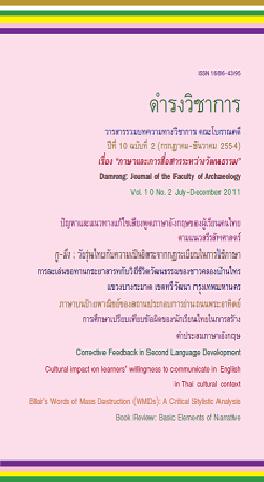กู-มึง : วัยรุ่นไทยกับความเป็นอิสระจากกฎระเบียบในการใช้ภาษา
คำสำคัญ:
ภาษาไทย, การพูด, วัยรุ่นไทย, การสื่อสารบทคัดย่อ
การใช้ภาษาของวัยรุ่นไทยในปัจจุบัน สะท้อนให้เห็นความต้องการที่จะเป็นอิสระจากระเบียบกฎเกณฑ์การใช้ภาษาที่กำหนดไว้ในตำราหนังสือไวยากรณ์ ดังเช่นตัวอย่างของการใช้สรรพนาม กู-มึง ที่ถูกกำหนดว่าเป็นสรรพนามที่ไม่สุภาพ แต่จากการศึกษาเอกสารและงานวรรณกรรมที่มีการใช้สรรพนามสองตัวนี้ก็ไม่ได้มีการให้เหตุผลว่าทำไม กู-มึง จึงถูกกำหนดว่าไม่สุภาพ และถึงแม้ว่า กู-มึง จะไม่สุภาพ แต่สิ่งที่วัยรุ่นต้องการคือภาษาที่จะใช้เป็นเครื่องมือสื่อสารระหว่างวัยรุ่นด้วยกันได้อย่างรวดเร็วทันใจ และตอบสนองความต้องการให้จะให้การสื่อสารนั้นช่วยกระตุ้นความสามัคคีความรักใคร่กันในหมู่พวกเดียวกัน และช่วยเหลือกันในยามที่จำเป็น ทำให้ทุกคนให้กลุ่มมีความอุ่นใจว่าตัวเองมีพรรคพวก ไม่ได้อยู่โดดเดี่ยวตามลำพัง ภาษาที่ใช้ภายในกลุ่มอาจเป็นภาษาที่คนนอกกลุ่มเห็นว่าไม่สุภาพหรือหยาบคาย สำหรับวัยรุ่นแล้วการแสดงออกด้วยภาษาในลักษณะเช่นนี้มีความสำคัญและมีความหมายมากกว่าการแสดงออกด้วยความสุภาพ
เอกสารอ้างอิง
กรมศิลปากร. เสภาเรื่องขุนช้างขุนแผน. กรุงเทพฯ: แพร่พิทยา. 2513.
กาญจนา นาคสกุล และคณะ. การใช้ภาษา. กรุงเทพฯ: เคล็ดไทย. 2521.
ธำรงศักดิ์ เพชรเลิศอานันท์. ร.ม.ว. คึกฤกษ์ ปราโมช นายกรัฐมนตรี. ศิลปวัฒนธรรมฉบับพิเศษ. 2546.
พุทธทาสภิกขุ. คู่มือปฏิบัติอานาปานสติสมบูรณ์แบบ. กรุงเทพฯ: ธรรมทานมูลนิธิ 2530.
ราชบัณฑิตยสภา. พจนานุกรมฉบับราชบัณฑิตยสถาน. กรุงเทพฯ: นานมีบุ๊คส์. 2542.
อิราวดี ไตลังคะ. ศาสตร์และศิลป์การเล่าเรื่อง. กรุงเทพฯ: มหาวิทยาลัยเกษตรศาสตร์. 2543.
Noss, Richard B. Thai Reference Grammar. Washington, D.C.: Foreign ServiceInstitute, 1964.
Smyth, David. Thai: An Essential Grammar. New York: Routledge. 2002. Wardhaugh, Ronald. An Introduction to Linguistics. New York: Basil Blackwell. 1986.
ดาวน์โหลด
ฉบับ
ประเภทบทความ
สัญญาอนุญาต
บทความนี้เป็นผลงานของข้าพเจ้าแต่เพียงผู้เดียว และ/หรือเป็นผลงานของข้าพเจ้าและผู้ร่วมงาน ตามชื่อที่ระบุในบทความจริง และเป็นผลงานที่มิได้ถูกนำเสนอหรือตีพิมพ์ที่ใดมาก่อน





